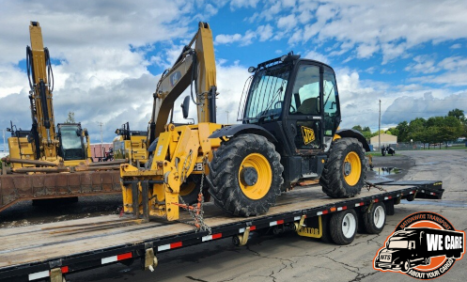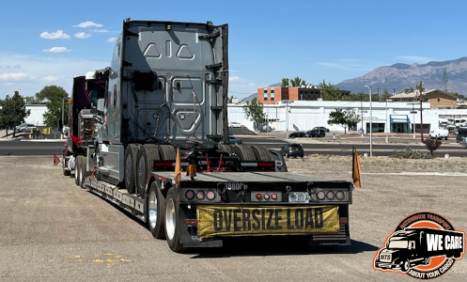- The Standardized Process for Exporting Cars
- Required Documentation for Auto Exportation
- The Automated Export System (AES)
- Can You Ship a Car by Yourself?
- Do You Need Insurance When Exporting Cars From the USA?
- Nationwide Transport Services: Your Trusted Logistics Partner
Auto exportation can be complex, mainly due to the documentation requirements. Learning the regulatory demands can save you a lot of trouble and ensure your vehicle’s safe and swift arrival at the desired location.
The Standardized Process for Exporting Cars
Shipping a motorway vehicle from the United States generally follows the same process, although documentation may vary:
- The exporter must present the vehicle to the U.S. Customs and Border Protection (CBP), together with all the relevant documentation describing the car, at the port of exportation.
- The document includes the vehicle identification number (VIN) or, in the absence of that, the product identification number (PIN). It helps to ensure you present all documents in time to avoid unnecessary hurdles.
- You must deliver the documents to the CBP at least 72 hours before the export. You may contact the customs authorities before the time provided to confirm you have all the applicable documentation for your state and jurisdiction intact.
- When you arrive at customs, a port director will provide you with the locations to present the vehicle and documents for inspection. Typically, the customs officers will assess your documents and compare them with the car to determine their authenticity. After that, the officer will mark the original documents.
- In most cases, the customs return the original documents to the exporter. Where customs retain the original title documents and cannot find them before exporting the vehicle, the exporter’s authenticated copy of the original documentation serves as evidence of compliance. There may be additional steps, depending on the circumstances.
Exporting a vehicle outside the country is only permitted when you meet these compliance requirements unless the car entered the U.S. under an in-bond procedure, a temporary importation bond, carnet or a personal exemption for non-residents who imported the vehicle for one year.
Required Documentation for Auto Exportation
Here are the standard documents you’ll need when exporting cars from the U.S.:
1. Certificate of Title
Vehicles used in the U.S. typically have an original certificate of title or salvage title. The vehicle’s owner must provide the original or a certified copy of the certificate of title with two additional copies to customs. The certified copy of the certificate must be issued by an authorized government agency and must include a signed statement that it is an authenticated copy of the original.
Where the shipment involves a U.S. government employee exporting the vehicle in conjunction with their reassignment abroad as directed by official travel orders, that employee must establish that they have complied with the sponsoring agency’s internal travel department procedures for vehicle exportation.
Where the vehicle was used, titled or registered outside of the U.S., the owner must present proof of ownership with the English translation where necessary and two complete copies of each document.
Again, where a scrap or junk certificate issued in the U.S. remains active, the owner must present the original certificate or a certified copy with two extra copies to the CBP.
2. Manufacturer’s Statement or Certificate of Origin (MSO/MCO)
The documentation requirements are different for newly manufactured and untitled vehicles. Newly manufactured vehicles purchased from a U.S. manufacturer, dealer or distributor and used in the country are generally issued an MSO instead of a certificate of title. The owner must provide the original MSO with two copies to the customs at the specified time and location.
3. Bill of Sale
Where the owner is not issued an MSO or certificate of title, the owner must establish that the jurisdiction where the vehicle comes from does not have ownership documentation requirements regarding the motor vehicle. The owner must provide the original documents proving their ownership, like a dealer’s invoice or bill of sale, with two copies.
The same applies when the vehicle is titled or has a certificate that is no longer valid, only that the owner would have to provide a written statement indicating that the car was procured in a bona fide transaction.
Owners who purchase antique cars that were never titled may apply this requirement. The same applied to special vehicles which entered the U.S. without conditions for a title. The essence of providing these documents is to prove that the vehicle was genuinely obtained.
4. Lien Release Documents
Where you share ownership in the vehicle with a third party, like in the case of leased vehicles or vehicles with a recorded lien in the U.S., the owner must provide the original or certified copy of the certificate of title with two complete copies and a separate written statement from the third-party indicating that the vehicle may be exported.
The written statement must be on the third-party’s letterhead and contain documents that describe the vehicle, including the VIN, the name of the lienholder, their contact information, the owner or lienholder’s signature and the date of the signature.
The Automated Export System (AES)
The AES is a system that the U.S. government uses to collect data on all exports. In most cases, exporters are required to file their shipment information — electronic export information (EEI) — through the AES before finalizing the export. The exporter does the filing on the automated commercial environment (ACE), an online portal that allows the transmission of their EEI to the AES.
U.S. citizens or residents with social security numbers will need to create an ACE account and provide an employer identification number (EIN) as part of the EEI before exporting. Exporters can apply for an EIN on the Internal Revenue Service (IRS) website. If you are a non-U.S. citizen, you must authorize an agent to file on your behalf and use their passport number in place of the EIN. The system uses the EIN for identification rather than tax purposes.
Can You Ship a Car by Yourself?
Yes, you can export a car from the U.S. if you have the correct information. However, most people leverage shipping companies because of their expertise. The auto exportation process can be complex and frustrating, especially when you’re unable to provide the necessary documents upon request. Partnering with reliable and efficient logistics and transport companies takes the load off your shoulders and ensures your vehicle arrives quickly and safely.
Do You Need Insurance When Exporting Cars From the USA?
While private parties and direct brokers are not required to carry insurance when exporting vehicles, shipping companies provide insurance on every shipment. However, insurance is essential to protect yourself against loss or damages.
Various third-party companies provide insurance for export vehicles, so you can search for the best coverage. You can secure an all-risk or total-loss-only coverage when shipping your car internationally. All-risk insurance covers any damage during shipping and is relatively more expensive. Total-loss-only insurance covers you if a total loss occurs, like in the case of disasters.
Nationwide Transport Services: Your Trusted Logistics Partner
Nationwide Transport Services provides international auto export services to individuals and businesses across the country. We have years of experience in the industry, which has allowed us to create efficient and reliable logistics systems focused on streamlining global exports. Our dedicated team is willing to listen to your needs and provide tailored solutions — your vehicle is in safe hands. Contact us today to learn more!


